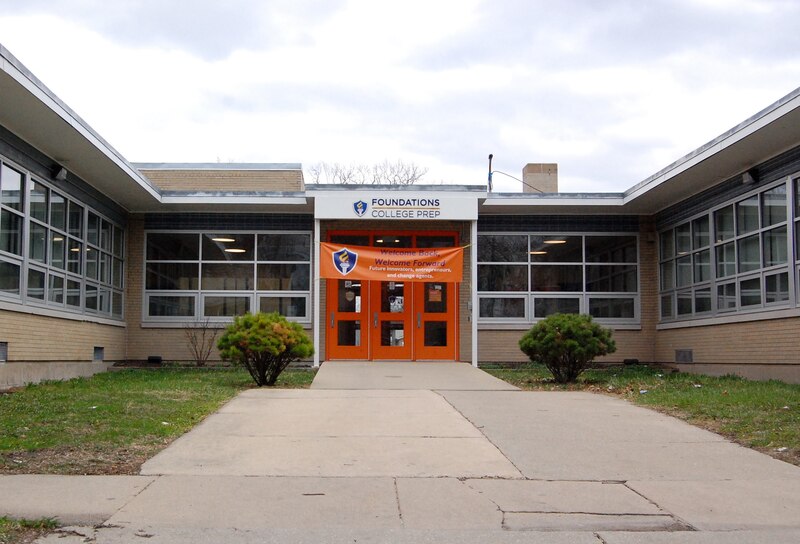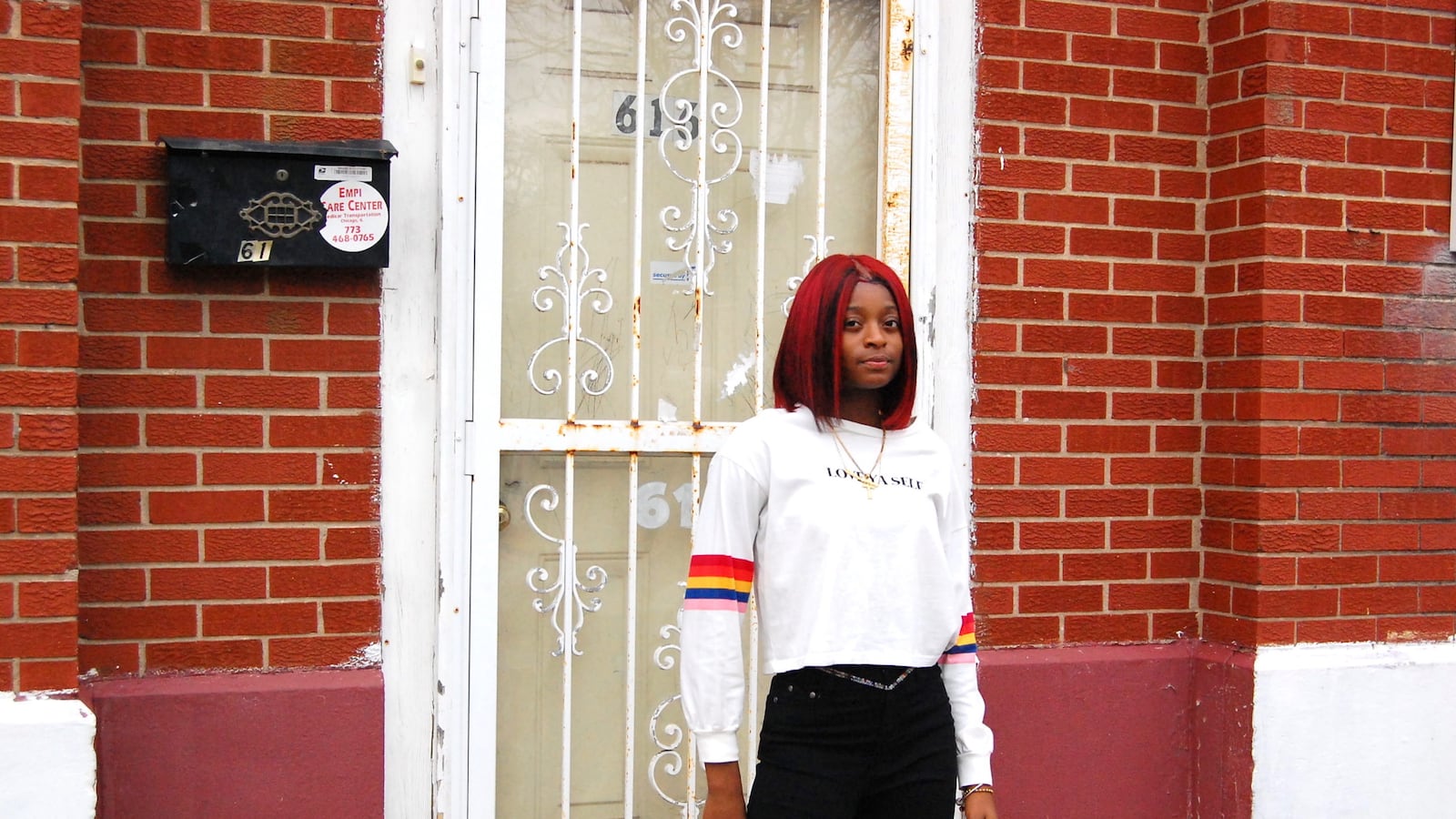Like many high school juniors, Sarah Alli-Brown has had a lot of thoughts swimming through her head these last two weeks.
Are we going to go back to school? What about the SAT? Would it be illegal to have SAT prep at school? Because I really, really, really need help.
Normally, Sarah would review SAT problems every day after school with her English teacher. But the practice sessions stopped two weeks ago when her Chicago school, like schools across the country, closed due to the coronavirus.
Now, the 16-year-old is trying to figure it out on her own. But the distractions feel endless. Sarah’s twin 9-year-old brothers need constant attention — especially her little brother with autism — and food, too.
“I was overwhelmed before,” Sarah said, “but now I’m overwhelmed even more.”
Sarah’s mother is the family’s sole breadwinner, working as a home health care aide during the day and at a community for adults with Alzheimer’s disease and dementia at night. Coronavirus hasn’t changed her hours, but now the boys are home with Sarah around the clock.
“I just kind of step up and be like the mom of the house,” Sarah said.
Just a few days after school let out, Sarah’s mother got a letter that added to her daughter’s growing mountain of responsibilities: Sarah’s small charter school won’t be reopening next year amid enrollment and financial difficulties. Now she’ll have to search for a new high school — in the middle of a pandemic.
***
For so many students who already struggled to manage the many stresses in their lives — whether due to poverty, community violence, or caregiving responsibilities — school is the glue helping to hold it all together. Now, as school buildings across the country shut down, students and families like Sarah’s are forced to go without the layers of structure and support that schools provide, making existing inequities even more pronounced.
In Chicago, students’ uneven access to the internet and computers means the school district has been slow to transition to remote learning. Officials say they will formally launch their plan in mid-April, which includes distributing devices and offering both paper and digital assignments. Charter schools like Sarah’s are making their own decisions, though the state now says schools must offer digital or other remote instruction.
For the last two weeks, though, Sarah hasn’t had much instruction at all. A few teachers checked in and gave her assignments, though some were optional and others won’t count unless they improve a grade. She didn’t hear from her other teachers.
When she does have assignments, she’s making it work. The criminal justice class she takes at a local community college, Kennedy-King, has shifted online, and the professor has been sending plenty of work to keep Sarah busy. This weekend, she curled up on her bed and read four chapters and answered dozens of reading comprehension questions.
The absence of most normal class work means that when she does find a quiet moment, she’s been focused on improving her SAT score so she can get into a good college.
“I wouldn’t say I’d put my grades to the side, but I’ve got to really focus on what’s right in front of me,” she said. “I’ve got to see the bigger picture.”
Math word problems are her biggest struggle, but sometimes the long reading passages give her trouble, too. Usually, her teacher would help her break them down. On a recent Monday afternoon, she opened one of the review books her school gave her and attempted to read a text about earth’s magnetic field, but got bored and gave up after 10 minutes.
“I know I’m capable of doing it,” she said. “It’s a self-control thing.”
***
For Sarah, everything about this moment has been made doubly hard knowing that her support network is both gone temporarily, thanks to the coronavirus, and about to break apart completely when the school closes for good.
Sarah’s school, Foundations College Prep on Chicago’s Far South Side, is one of the city’s few remaining charter schools without the financial support of a larger network. It’s always been a small school, but recently it saw enrollment drop by 23% in a single year, even as the school added a grade.
Though that’s steep, enrollment declines are not uncommon in Chicago’s segregated black communities, where schools compete for a dwindling number of students, many of whom travel long distances to find a high school outside their neighborhood with a higher rating, more academic offerings, or a better reputation. Fewer students mean less funding, which can become unsustainable, pandemic or no pandemic.
Sarah’s mother, Olufunke Toogun, was never sure her daughter, who skipped the fifth grade, belonged at Foundations — “She’s too smart,” Toogun said — but Sarah liked many of her teachers and classmates.
“School kind of got me away from a lot of things that are going on in my life and a lot of things that are going on at home,” Sarah said. “It got me a place … where this is about my future. I’m sitting down, I’m learning, and can’t nobody stop me or distract me from those goals I want to achieve.”

So when Sarah first saw other students talking about the closure on Facebook on March 19 — “a bad, bad way” to find out — she didn’t believe it.
It sunk in when she read the letter from her principal, which explained the school’s financial struggles. Three local charter networks, the principal wrote, “will work with us to help transition those students who wish to attend any of these schools.”
“At first, I thought it was like, OK, everything is crashing down, the world is really about to end at this point because my school is closing down,” Sarah said. “But I’ve come to my senses.”
She’s had to advocate for herself in the past, so she knows she needs to focus on figuring out what’s next. Finding a new school won’t be simple, though, given that she lives in one of Chicago’s most racially segregated and economically disadvantaged communities, with few good high school options, especially without a test-in component.
Sarah hasn’t gotten much other information about her choices. She’s not sure about trying to get into the selective test-in high school that’s about three miles from her home. And she never considered going to her neighborhood school, Fenger High School. The school has struggled academically — a former principal’s efforts to turn it around and combat violence were the subject of a CNN documentary series in 2014 — and since then it has lost students, funding and staff, too.
So she’s planning to apply to a school run by the Noble Network of Charter Schools about four miles from home. Sarah visited once to watch a basketball game, and her mom has promised to take her on a tour whenever schools are open again.
Noble has taken students from closed schools before, but officials there said the network won’t know what seats are open until around July 1. Sarah could be in limbo for months.
***
There are moments she knows she’ll get through all of this — the stress, the added responsibilities, the pandemic — but then there are others when her emotions start to creep in.
Sometimes she feels scared for her mom, who can’t stop working. Sometimes she misses those long Sunday services at church followed by a potluck meal, where her mom’s jollof rice is a standout dish. Sometimes she gets so bored she just goes to sleep.
“Everybody is stressed, depressed, just tired of it all,” she said.
Lately, she’s started to wonder how it will feel to start over as a senior at a new high school. On Tuesday, she cried after she completed a video interview as part of her application for a prestigious program that mentors first-generation college students — it had been changed from an in-person interview because of the coronavirus. She re-recorded one answer three times, trying to get it right, but she ended up not answering the question at all.
“To think I’m messing up my chances,” she said, left her “kind of heartbroken.”
There have been some bright spots, like when her family recently celebrated her older brother’s birthday with chocolate cake and ribs, and when Sarah found out her after-school job tutoring younger students would continue to pay her a stipend.
She’s been trying to stay busy by making videos on YouTube and TikTok, ordering clothes online, and calling her friends. But then she remembers she’s supposed to be in class, learning how to drive, and running track.
“There’s nothing I can really look forward to,” she said. “I just want to go back to school.”


